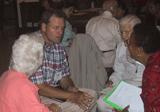
Verdict came as Deltans worked toward reconciliation
This commentary by John S. Clark is reprinted from the Sunday, June 26, 2005 Delta Democrat Times; Greenville, Mississippi
It's ironic that on the day Klansman Edgar Ray Killen was found guilty of manslaughter in the deaths of three civil rights workers 41 years ago in Neshoba County, we were wrapping up a seminar on community empowerment at St. James' Episcopal Church in Greenville.
Sponsored by the Very Rev. Elizabeth Jones and the Mastery Foundation, the two-day seminar was attended by about 40 people from the Greenville, Leland and Clarksdale areas who are interested in learning how to become better community leaders.
Those who attended were promised they would learn new ways to relate to others, develop a better understanding of our communities, develop better leadership skills and create new conversations that can lead to new possibilities.
The Mastery Foundation has been offering workshops for lay people and ordained ministers since 1983. The seminars are designed to help generate dialogue and leadership in communities in need of reconciliation and healing. The group first began working with Catholics and Protestants in Ireland and began its U.S. initiative in Corinth, Miss.
Skeptical at first about putting two days aside to get in touch with my possibilities, as the brochure promised, I later came to realize that this was time well spent.
We spent time getting to know one another. The group was composed of a diverse mix from many factions of the Delta: housewives, ministers, businessmen, artists. They were young, old, rich, poor, black, white.
We learned about the different structures of learning, from the traditional classroom to the community circle. We talked about the differences between power, force and resignation, which comes when a person doesn't have access to power but chooses not to use force.
But more importantly, we came back on the second day with a "statement of possibility" that defined our hopes and wishes for our communities. We wrote them on a piece of paper on the wall; They included words like "Education," "Jobs," "Passion," "Help for hurting people," "Inclusion," "Freedom," "Integrity" and "Racial Harmony."
Probably the most powerful and moving session of all came at the end of the second day when we all sat in a circle and talked about what we got out of the sessions. Some in the room were moved to tears as they thanked the others in the group for their honesty and commitment or confessed to past actions that may have contributed to community division.
As I left the church that day I thought about Edgar Ray Killen and wondered how somebody could be so full of hate that he could order the execution of three young men following their consciences and trying to do what they thought was right.
I wondered what kind of pulpit this so-called "preacher" spoke from, a platform used to spread the doctrine of hate, violence and murder. I thought it was fitting that the guilty verdict came 41 years to the day that the slayings took place and remembered the words of Neshoba County Democrat Editor Stanley Dearman who spoke recently to members of the Mississippi Press Association. He said that the only way to bring closure to this case was to try Killen for murder.
And I wondered what kind of prison pulpit Killen would be preaching from when he is finally sent away to serve out the rest of his life behind bars.
Will he continue to preach the gospel of hate and intolerance or, faced with his own mortality, will he come to realize the pain and suffering his doctrine of evil has caused the relatives and friends of his helpless victims?
I wonder what his statement of possibility will be.

